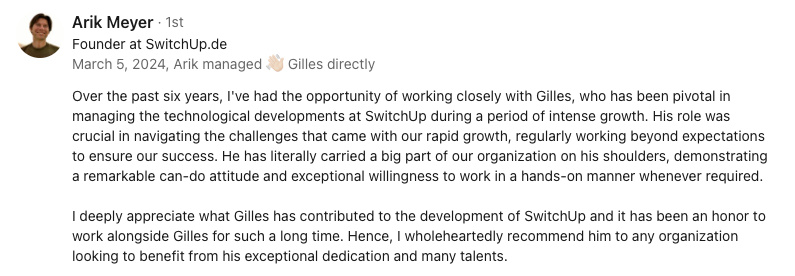Abstract:
The article explores the vibrant and innovative tech communities across Europe, focusing on their potential benefits for startups, particularly in the data warehousing sector. These regional communities offer rich opportunities for growth, collaboration, and learning, although navigating them can be challenging. Local tech events and meetups in bustling hubs like Berlin and London serve as vital platforms for startups to connect with cutting-edge technologies and build valuable networks. Such interactions often lead to partnerships and community-driven projects, fostering groundbreaking solutions. The article highlights the importance of academic collaborations for accessing advanced research and emerging talent, with examples like Trifacta and LeanXcale benefiting from partnerships with academic institutions. Cross-industry collaborations further enhance innovation by allowing startups to learn from diverse sectors, as seen in initiatives like the EU Horizon 2020 projects. Open-source tools and community feedback play a crucial role in developing scalable, cost-effective solutions, with platforms like ClickHouse and Firebolt exemplifying this trend. Ultimately, engaging with Europe's tech communities offers startups a pathway to unlock potential, leveraging collective knowledge and resources to drive their strategies forward.
Exploring regional tech communities in Europe can be both exciting and challenging for startups, particularly those in data warehousing. These communities are rich with innovation and collaboration opportunities that foster growth and learning. However, tapping into these opportunities isn't always straightforward, and the challenges can appear daunting. Fortunately, local tech events and meetups offer excellent venues for startups to connect with the latest technologies and strategies. Imagine bustling hubs like Berlin and London, where tech enthusiasts gather to share insights and build valuable connections. These interactions not only enhance knowledge but also create partnerships that propel startups forward. As you navigate this dynamic environment, the potential to discover groundbreaking solutions through community projects and academic partnerships becomes increasingly promising.
Leveraging Regional Tech Communities
Exploring regional tech communities in Europe offers a wealth of opportunities for startups, especially in data warehousing. These communities are ideal for innovation, collaboration, and growth by connecting startups with new technologies and strategies.
The Role of Local Tech Events and Meetups
Local tech events and meetups are crucial for startups aiming to push the limits of data warehousing innovation. By attending these gatherings, startups can exchange experiences and insights. Berlin's vibrant tech scene hosts events like Data Natives, which focus on fostering dialogue and collaboration among tech enthusiasts. Startups not only gain immediate knowledge but also build lasting professional networks that enhance their capabilities.
Networking at these events is invaluable for startups looking to stay updated with the latest technologies. Benefits of participating in local tech meetups include:
- Exposure to cutting-edge technologies and strategies.
- Opportunities to collaborate with industry experts and potential partners.
- Access to workshops and talks providing practical insights into emerging trends.
Networking often leads to collaborations that boost a startup's technological prowess. For instance, Big Data LDN in London serves as a hub for such interactions, offering insights into the future of data warehousing technologies.
These tech events also foster partnerships and collaborations that lead to successful projects. In Berlin, tech meetups often act as catalysts for growth, helping startups significantly expand their capabilities. Consider two startups meeting at a local event and deciding to collaborate on a project—this could lead to groundbreaking solutions benefiting the entire community.
Community-Driven Projects and Partnerships
Community-driven projects are often at the forefront of innovation, with platforms like Snowflake standing out. Startups in Europe rely heavily on user feedback to shape their tools, ensuring features meet market demands. Beyond individual projects, partnerships are crucial. A notable case is Snowflake's collaboration with its user community, which has led to refined, user-centric solutions.
Local partnerships with tech firms often result in customized tools tailored to meet specific needs. Imagine a Stockholm-based startup partnering with a local firm to develop a data solution. This could evolve into a broader initiative, creating advanced tools that elevate capabilities across the region. Stockholm's thriving ecosystem shows how such partnerships foster innovation.
Real-world examples illustrate the value of community partnerships in enhancing data warehousing. Noteworthy case studies include:
- Paris's European Data Incubator supports startups with mentorship and funding to develop cutting-edge solutions.
- Academic collaborations provide startups with access to large datasets, refining and testing their models.
These examples highlight the tangible benefits of community collaborations, showing how startups leverage partnerships to drive innovation, particularly when faced with challenges like limited resources and the need for rapid scalability.
Strengthening Innovation through Academic Collaborations
Access to Cutting-Edge Research and Talent
Collaborations with academic and research institutions give startups unique access to advanced research and technologies. These partnerships are invaluable, offering a competitive advantage through state-of-the-art solutions still in research. Such collaborations enable startups to integrate emerging technologies into their efforts, keeping them at the forefront of developments. Beyond tech, these partnerships offer access to emerging talent, as universities house students eager to apply their knowledge.
Moreover, universities act as a vital pipeline of skilled graduates essential for developing sophisticated systems. These graduates bring fresh ideas and specialized expertise, significantly contributing to a startup's ability to innovate. A report highlights that graduates are key players in startups, driving advancements and helping develop robust infrastructures. Joint R&D projects further this synergy by combining academic research with industry needs, fostering environments where innovation thrives.
Participating in joint R&D projects with academic institutions allows startups to tackle challenges effectively. Such collaborations offer access to academic expertise and innovative problem-solving approaches. For instance, the University of Cambridge has partnered with various startups, resulting in new algorithms enhancing efficiency. Real-world case studies showcase success stories where startups overcome challenges through academic collaboration.
Case Studies of Successful Academic Partnerships
A great example of successful academic collaboration is Trifacta's partnership with TU Berlin. This partnership has significantly improved Trifacta's capabilities by incorporating scalable data processing and machine learning expertise. As a result, Trifacta has enhanced its product offerings, particularly for handling large datasets.
Another notable example is LeanXcale's collaboration with Universidad Politécnica de Madrid (UPM), focusing on a scalable database platform. This partnership leveraged UPM's research on distributed databases, facilitating advancements in LeanXcale's technologies, leading to significant enhancements and improved performance.
Memgraph's collaboration with the University of Zagreb shows how academic partnerships can drive advancements in niche areas. Through access to the university's research on graph theory, Memgraph improved performance and scalability. Key improvements include:
- Enhanced algorithms for faster processing
- Increased scalability for larger datasets
- Improved integration with existing solutions
These examples highlight how strategic partnerships with academic institutions lead to groundbreaking developments, providing startups with tools and expertise needed to excel.
Cross-Industry Collaborations Enhancing Innovation
Learning from Diverse Sectors
Cross-industry collaborations often lead to innovative solutions for startups refining their strategies. By looking at practices from other industries, startups can adapt fresh ideas. For instance, the finance sector's rigorous data governance offers lessons in maintaining data integrity. Applying these practices enhances data reliability and compliance. Similarly, the healthcare industry's models inspire startups to combine diverse datasets efficiently, boosting decision-making capabilities.
Such collaborations often result in improvements tailored to specific needs. Picture a tech startup teaming up with a healthcare provider. Through this partnership, they discover new methodologies for secure data sharing, developing a solution catering to both industries' needs. This scenario isn't just hypothetical—it's shaped by initiatives like the EU Horizon 2020 projects, encouraging cross-sector partnerships. These collaborations pave the way for practical solutions addressing immediate and future demands.
Real-world examples show how cross-industry initiatives enhance abilities. Take the FIWARE Foundation's work with smart cities: collaborating across sectors, they improve urban platforms for better data integration. This exemplifies how partnerships lead to advancements benefiting diverse industries. Startups engaging in these collaborations gain insights transforming their strategies into robust, future-proof solutions.
Examples of Cross-Industry Initiatives
Another initiative is the DataBench Project, aligning practices with real-world needs across sectors. By establishing benchmarks and best practices, this project helps industries enhance capabilities. The outcomes are substantial, refining strategies and improving standards. The collaboration within organizations like EIT Digital ensures practices meet high standards.
The VAMDC collaboration significantly improves accessibility for research purposes by bringing together scientific institutions and IT companies to manage complex data. This effort shows how partnerships tackle niche challenges, leading to breakthroughs serving broader communities.
Community-driven innovation shows how cross-industry partnerships lead to advancements. For example:
- Industry-specific practices: Derived from finance and healthcare, enhancing governance and integration.
- Tailored solutions: Projects like DataBench provide industry-centric benchmarks.
- Advanced management: Seen with VAMDC's work in the scientific community.
These initiatives show the potential of collaborations, offering startups a roadmap to elevate strategies through shared knowledge.
Community-Driven Innovation in Data Warehousing Tools
In the ever-changing landscape of data warehousing, community-driven innovation has become essential for startups, providing access to cutting-edge tools. By leveraging open-source projects and community feedback, startups create scalable, cost-effective solutions for dynamic business needs.
Open-Source Projects and Tools
Open-source tools are indispensable for startups seeking high-performance solutions without high costs. These tools evolve through community contributions, ensuring they remain at the forefront. Notable examples include ClickHouse and MonetDB, providing robust capabilities. ClickHouse offers real-time processing with its columnar format, making it a favorite among resource-limited startups. MonetDB excels in handling scientific databases with its architecture.
Community contributions are crucial for the dynamic evolution of tools like Apache Pinot. Initially developed at LinkedIn, it thrives on feedback, allowing it to adapt to specific business needs. This approach ensures startups can integrate the latest features, maintaining a competitive edge.
Platforms like Firebolt show how cloud-native architectures support startups with complex queries. Imagine a startup needing to process vast datasets quickly. Firebolt's architecture provides a scalable solution that doesn't break the bank.
The Role of Community Feedback
Community feedback is integral to ongoing development, ensuring tools align with real-world demands. Platforms like Snowflake incorporate user feedback into development cycles, allowing swift adaptation to needs and trends.
Forums such as GitHub and Stack Overflow are vibrant hubs for collaborative development, where users share insights and solutions. These platforms enable startups to harness knowledge and experiences, leading to improved functionality and reliability.
Open-source contributions keep tools innovative and aligned with user needs. By engaging with projects like PostgreSQL and Apache Hadoop, startups contribute to the community and benefit from collective experience. This synergy drives the evolution of tools, empowering startups to excel.
Engaging with Europe's vibrant tech communities offers startups a chance to unlock potential, especially in data warehousing. Immersing in local events and meetups opens doors to innovative solutions that can transform business. Opportunities abound in cities like Berlin and London, where idea exchange leads to cutting-edge technologies. Community projects and academic partnerships amplify these benefits, providing access to research, talent, and insights enhancing competitive edge. So, what's holding you back? Explore these communities and harness the collaborative spirit to elevate your strategies. How have tech communities transformed your startup journey?














